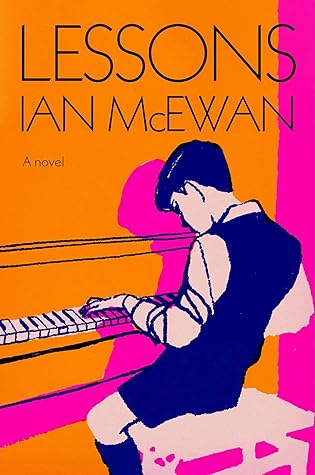More on this book
Community
Kindle Notes & Highlights
At last he gave up and moved on. Soon he was walking by the Wall, along Niederkirchner Straße. In white paint a graffito read, Sie kamen, sie sahen, sie haben ein bisschen eingekauft—they came, they saw, they did a little shopping. In historical Berlin, Caesar would certainly be remembered. Roland slowed by the remnants of the demolished Gestapo headquarters. There was nothing left above ground. He stopped to look down. A row of white-tiled basement cells glinted in the semi-dark. Here, Jews, communists, social democrats, homosexuals, countless others spent their final moments in agony and
...more
But in the prosperous West, after the mass carnage of two world wars, to live without death became the peculiar privilege and vulnerability of a protected generation. Loud and hungry for sex and goods and much else, it was squeamish about extinction. To Roland
there was one little story, a celebrated thought experiment, well known even to those who had never heard of quantum mechanics. Schrödinger’s cat. A cat concealed in a steel chamber is either killed or not by a randomly activated device. The cat’s state is not known until the chamber is opened. In Schrödinger’s account it is both alive and dead until that moment. In the good outcome, at the reveal, a wave function collapses, the live cat jumps into the arms of its owner, while its other version continues as dead in a universe inaccessible to the owner or her cat. By extension, the world
...more
This highlight has been truncated due to consecutive passage length restrictions.
in the mid-seventies, he had formed a poor impression of British writers. It was a defensive posture and dismissive. He saw them on TV arts programmes as well as on stage. He could not take seriously these chaps in ties and suits or tweeds who wore brogues and cardigans when at home all day, who belonged to the Garrick and the Athenaeum, who lived in solid north London villas or Cotswold mansions, who spoke loftily, as one might after a lifetime pontificating from All Souls, Oxford; who had never risked a peep round the doors of perception by taking a drug other than tobacco or alcohol, which
...more
Alissa’s memoir was a bestseller in Germany and other countries, including Britain. The vile childhoods of others were not only a comfort to many but a means of emotional exploration, and an expression of what everyone knew but needed to keep on hearing: our beginnings shape us and must be faced. Roland was sceptical and not out of loyalty
But if Jane had harmed her daughter, what of the harm that daughter had done her son? Where was the novelist’s honest reckoning? And as with the mothers, so with the father. Roland’s restless marginal life of truncated education and serial monogamy had become Lawrence’s. It wasn’t exactly a gift.
Whenever Roland met religious figures he felt obliged to protect them from his disbelief, which was so complete that even atheism bored him. He was always friendly in an exaggerated way with the local vicar when he met him in the street.
Still, in the Second Law, which was the third because they started at zero, he was reminded of a truth obvious to all householders. Just as heat bled out into cold and not the reverse, so order bled out into chaos and never in reverse. A complex entity like a person eventually died and became a disordered pile of disparate bits which must begin to move apart. The dead never sprang into ordered life, never became the living, whatever the bishops might say or pretend to believe. Entropy was a troubling and beautiful concept that lay at the heart of much human toil and sorrow. Everything,
...more
By what logic or motivation or helpless surrender did we all, hour by hour, transport ourselves within a generation from the thrill of optimism at Berlin’s falling Wall to the storming of the American Capitol? He had thought 1989 was a portal, a wide opening to the future, with everyone streaming through. It was merely a peak.
One great inconvenience of death, according to Roland, lay in being removed from the story. Having followed it this far he needed to know how things would turn out. The book he required had a hundred chapters, one for each year—a history of the twenty-first century. As things stood he might not get a quarter of the way through. A glimpse of the contents page would be enough. Would a catastrophic global overheating be headed off? Was a Sino-American war woven into the pattern of history? Would the global rash of racist nationalism yield to something more generous, more constructive? Might we
...more
The temptation of the old, born into the middle of things, was to see in their deaths the end of everything, the end of times. That way their deaths made more sense. He accepted that pessimism was the good companion of thought and study, that optimism was the business of politicians, and no one believed them. He knew about the reasons to be cheerful and had sometimes cited the indices, the literacy rates and so on. But they were relative to a wretched past. He couldn’t help himself, there was a novel ugliness about. There were nations run by well-dressed criminal gangs intent on
...more
This highlight has been truncated due to consecutive passage length restrictions.
There was one emollient nostrum he liked: things will never be as good as we hoped or as bad as we feared. But imagine showing a well-meaning Edwardian gent a history of the twentieth century’s first sixty years. The combined mega-deaths of Europe, Russia and China would cause him to buckle and weep. Enough! Those angry or disappointed gods in modern form, Hitler, Nasser, Khrushchev, Kennedy and Gorbachev may


